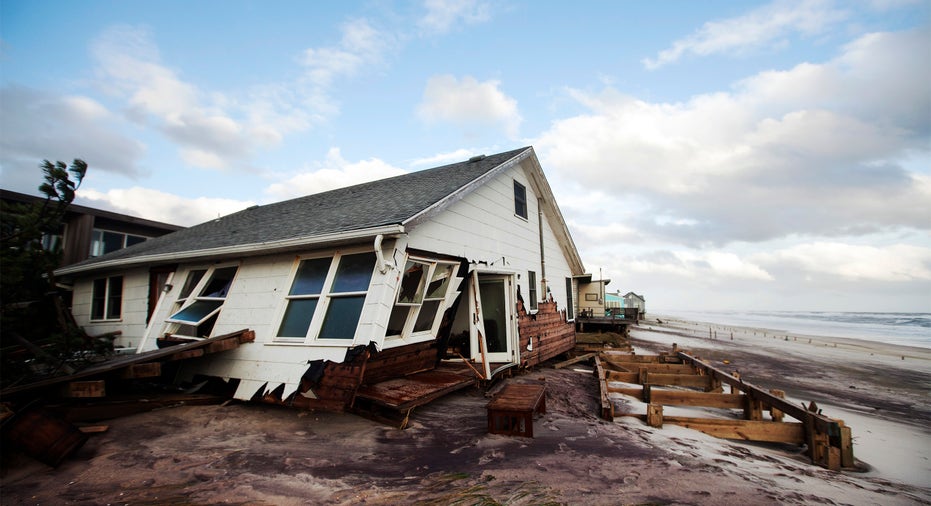It's Disaster Season: Is Your Home Ready?

It's the time of year to brace yourself for natural disasters. Hurricane season is starting to heat up, adding to the threats from tornadoes and wildfires. If a storm rips the roof off your home, or a wildfire burns it to the ground, you'll need to be prepared to file a homeowners insurance claim.
In 2013 alone, 29 major catastrophes wrought almost $13 billion in damages, generating 1.8 million claims, according to the Insurance Information Institute (III).
Perhaps the most crucial step is making sure you have the homeowners insurance you need. "Policyholders need to understand their coverage," says Matt Scott, senior vice president of claims for The Hartford.
- It's important to have adequate coverage, along with the right coverage, so Scott suggests having a conversation with your insurance agent each year. (Make sure you're getting all the proper discounts if you have an auto policy with the same company, too.)
- You also should make an inventory of your home's contents, and consider buying a rider if you have expensive items, such as jewelry and electronic equipment, to insure.
- If you live in a hurricane- or flood-prone area, you also should obtain a policy with the National Flood Insurance Program, or that flood damage won't be covered, Scott says.
- And if you're in an area where earthquakes are likely to strike, you'll want to consider a separate earthquake policy.
When Disaster is Imminent
While everyone hopes the big one will pass them by, if your home is damaged in a disaster, there are steps you should take as soon as it occurs.
Homeowners are responsible for "doing whatever they can within the realm of safety to prevent more damage from happening," says Lynne McChristian, the III's Florida representative.
So if a storm blows out your window, you should go ahead and board it up as you soon as you're able.
If you need to hire a contractor to do things like install a tarp on your roof or board up broke windows, Scott cautions you to "limit your contractual obligation to just that work," rather than granting the contractor carte blanche to make all the repairs following the disaster.
April Eaton, a spokesperson for Allstate, says most of her company's homeowners insurance policies reimburse customers for reasonable temporary repairs made to prevent more damage from occurring, up to a specific limit.
It's important to save your receipts so your insurance company will know how much you've spent for temporary repairs.
If your home sustains damage, your homeowners insurance will likely include:
- Dwelling insurance, which pays for damage or destruction of your home and other structures on your property. While standard homeowners coverage comes with a traditional deductible, windstorm deductibles tend to be 1 to 5% of the home's value. If your deductible is 5% and your home worth $200,000, you would need to pay the first $10,000 out of pocket.
- Personal property insurance, which covers the contents of your home;
- Loss of use, which pays for living expenses if your home sustains so much damage you can't live in it while repairs are made. But don't count on it after a flood. Not only do standard policies not include coverage for flood damage or loss of use afterward, even the National Flood Insurance Program excludes additional living expenses.
If your disaster is of a different nature, such as someone being attacked or killed in your home, your homeowners coverage also should apply, McChristian says. It also is likely to include:
- Liability insurance, which protects you if you're sued and found legally liable for someone's injury;
- Medical payments, which will cover the medical bills if someone is hurt on your property.
What to Expect in the Aftermath
In the wake of a widespread disaster, your homeowners insurance company should be quick to respond. If it's a hurricane, which can be forecast in advance, your company will move claims adjusters into the vicinity ahead of the storm, so they can hit the ground running once the disaster has passed and law enforcement sounds the all clear.
If it's something that can't be predicted, such as an earthquake, your company should dispatch claims adjusters immediately after the event.
If your home sustains damage, you should file an insurance claim as soon as possible. Because insurance documents can go up in smoke or blow away in a disaster, it helps to have your insurance information stored in a separate location, Scott says.
Eaton recommends taking plenty of photos of the damage and list items that have been damaged or destroyed. Doing a home inventory long before a disaster threatens can help speed the claims process along.
Some companies, such as The Hartford, have a mobile response team that they send to disaster sites, offering services such as an ATM, email and telephones, so you can "find some element of normalcy," Scott says.
Your insurance company has a list of contractors it can recommend to make repairs after a disaster, McChristian says. You also can hire your own contractor, but you need to make sure the company is properly licensed and bonded.
"Fraud is a serious problem" in the wake of a major disaster, Scott says. That means that if you plan to hire a contract on your own, you should check their references and get them to detail all they propose to do in writing. "You really need to do your homework."
The original article can be found at Insurance.com:It's disaster season: Is your home ready?



















